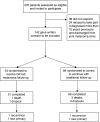Patient satisfaction with GP-led melanoma follow-up: a randomised controlled trial
- PMID: 20461089
- PMCID: PMC2869159
- DOI: 10.1038/sj.bjc.6605638
Patient satisfaction with GP-led melanoma follow-up: a randomised controlled trial
Abstract
Background: There are no universally accepted guidelines for the follow-up of individuals with cutaneous melanoma. Furthermore, to date, there have been no randomised controlled trials of different models of melanoma follow-up care. This randomised controlled trial was conducted to evaluate the effects of GP-led melanoma follow-up on patient satisfaction, follow-up guideline compliance, anxiety and depression, as well as health status.
Methods: A randomised controlled trial of GP-led follow-up of cutaneous melanoma was conducted over a period of 1 year with assessment by self-completed questionnaires and review of general practice-held medical records at baseline and 12 months later. It took place in 35 general practices in North-east Scotland. Subjects were 142 individuals (51.4% women 48.6% men; mean (s.d.) age 59.2 (15.2) years previously treated for cutaneous melanoma and free of recurrent disease. The intervention consisted of protocol-driven melanoma reviews in primary care, conducted by trained GPs and supported by centralised recall, rapid access pathway to secondary care and a patient information booklet. The main outcome measure was patient satisfaction measured by questionnaire. Secondary outcomes were adherence to guidelines, health status measured by Short Form-36 and the Hospital Anxiety and Depression Scale.
Results: There were significant improvements in 5 out of 15 aspects of patient satisfaction during the study year in those receiving GP-led melanoma follow-up (all P<or=0.01). The intervention group was significantly more satisfied with 7 out of 15 aspects of care at follow-up after adjustment for potential confounders. There was significantly greater adherence to guidelines in the intervention group during the study year. There was no significant difference in health status or anxiety and depression between intervention and control groups at either baseline or outcome.
Conclusions: GP-led follow-up is feasible, engenders greater satisfaction in those patients who receive it, permits closer adherence to guidelines and does not result in adverse effects on health status or anxiety and depression when compared with traditional hospital-based follow-up for melanoma.
Conflict of interest statement
The authors declare no conflict of interest.
Figures
Comment in
-
Is GP-led follow-up feasible?Br J Cancer. 2010 May 11;102(10):1445-6. doi: 10.1038/sj.bjc.6605667. Br J Cancer. 2010. PMID: 20461088 Free PMC article. No abstract available.
References
-
- Adewuyi-Dalton R, Ziebland S, Grunfeld E, Hall A (1998) Patients’ views of routine hospital follow-up: a qualitative study of women with breast cancer in remission. Psycho-Oncology 7: 436–439 - PubMed
-
- Bjelland I, Dahl AA, Haug TT, Neckelmann D (2002) The validity of the Hospital Anxiety and Depression Scale: an updated literature review. J Psychosom Res 52: 69–77 - PubMed
-
- Cox K, Wilson E, Heath L, Collier J, Jones L, Johnston I (2006) Preferences for follow-up after treatment for lung cancer: assessing the nurse-led option. Cancer Nurs 29: 176–187 - PubMed
-
- Dancey A, Rayatt S, Courthold J, Roberts J (2005) Views of UK melanoma patients on routine follow-up care. Br J Plast Surg 58: 245–250 - PubMed
-
- Donner A, Klar N (2000) Design and Analysis of Cluster Randomization Trials in Health Research. Arnold: London, UK
Publication types
MeSH terms
Associated data
Grants and funding
LinkOut - more resources
Full Text Sources
Medical


